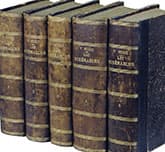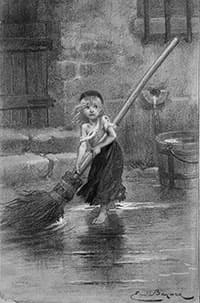Les Misérables
Critique • Quotes
 First edition in five volumes
First edition in five volumesFirst publication
1862
Literature form
Novel
Genres
Literary, historical fiction
Writing language
French
Author's country
France
Length
Approx. 560,500 words
The miserable truth
Les Misérables is one of the few translated books English speakers know by the original title, in part because we are familiar with the name (or its abbreviation Les Miz) from popular film and stage productions.
But that familiarity doesn't mean most of us know the book itself well, for those adaptations cover only a small fraction of the world explored in Hugo's gargantuan, multi-faceted and absorbing novel.
It may be joked that Les Misérables could hold down several spots on any greatest literature list. Not because it's very long (though it is) and not because it's often been published in several volumes (and it has). But because, well, Victor Hugo is the equivalent of several ordinary great writers and his masterpiece leads us exhaustively through all his guises.
There's the narrator of the thrilling and heartbreaking story of Jean Valjean, once imprisoned for stealing a loaf of bread, pursued for years by the obsessed policeman Javert for a petty crime and on the run to protect the orphan girl Cosette. This is the story best known to the public by its adaptations.
Intertwined with that narrative is the romantic story of the law student Marius Pontmercy with his own unsettled past, falling in love with Cosette while his politics lands him on the barricades during the 1832 rebellion in Paris.
Then there's Hugo the historian, reporting (over 19 chapters!) the Battle of Waterloo, covering Napoleon's last military campaign and the meeting of a couple of minor characters which is fateful for the novel's main story. And the philosopher-historian delivering his treatises on the nature of revolutions and uprisings, as fighting erupts in the streets.
Plus there's the melodramatic author of a dozen other subplots each of which would furnish entire books for other writers. Just one example: the bitter story of the working-class girls who are seduced and abandoned by well-to-do students, out of which raises the pathetic story of one of the poor women, Fantine, forced to leave her daughter (the aforementioned Cosette) in the care of abusive innkeepers.
Hugo is famous for his long digressions (as we've seen in The Hunchback of Notre-Dame), not all of which are strictly necessary to advance the overall narrative. This sounds like bad, undisciplined writing. Many a reader, with the modern penchant for fast-moving page-turning plot is turned off by these side trips.
But if you give up the idea of racing though the story (although there are plenty of thrilling chapters built for racing through) and you sit back to indulge the author as he goes down his winding paths, you may find yourself drawn down each byway. The writing and thoughts are always interesting, regardless of whether you can immediately see its connection with the larger story. Hugo is just a brilliantly engaging writer, no matter how obscure the topic.
The big picture
His seeming diversions help create a larger world of intellect, emotion and conflict against which the intimate human drama plays out in his novels. It's all related at some level.
Like the greatest works of many other writers of the mid-to-latter nineteenth century (Charles Dickens, Elizabeth Gaskell, George Eliot and Leo Tolstoy come to mind) Les Misérables wends its way through all levels of society. Although Hugo's sympathy lies mainly with one group in society (the novel's title should give you a hint), he writes insightfully about everyone from street urchins to the king of France—with the multitudinous factory workers, students, shop owners, minor aristocrats, nuns, police, soldiers, artists and criminal underclasses in-between.
As with Dickens, much is rightly made of Hugo's advocacy for the downtrodden—but his moral perspective in Les Misérables, as in Dickens's novels, is mainly that of the nationalistic middle class. While the plight of the poor is heart-rendingly displayed, success is depicted as rising above their class to join the petite bourgeoisie. Jean Valjean rises repeatedly from extreme poverty and criminal conviction, at one time becoming a successful manufacturer and smalltown mayor, and later raising Cosette from abusive servitude to Parisian respectability. The novel's ending comes with a fortune being bestowed upon Marius and Cosette.
Hugo's views, progressive for his time, are also exemplified in his obvious sympathy for the continual republican revolutions throughout the time period of the novel. It can be noted, though, he was later less enthusiastic about the more proletarian-inspired Paris Commune uprising of 1871.
The big hope
Despite all that's been said of his didactic digressions, Hugo is accused of being overly sentimental in Les Misérables. His writing is sometimes compared unfavourably to the work of hyper-realist French authors like Honoré Balzac, Gustave Flaubert and Émile Zola who strive to economically portray life exactly as it is—in much shorter and sharper volumes.
But while we note the deliriously happy ending and the numerous heart-touching moments in Les Misérables, we can also point out the savagely desperate points in its stories. Many of the vivid characters—Fantine, Gavroche, Éponine, the ill-fated revolutionary students, even the dutiful Javert—suffer sad demises, though admittedly almost always in dramatic circumstances.
But this is not so much in the service of realistic depiction as it is part and parcel of Hugo's preferred realm of romanticism—one might almost say revolutionary romanticism. That is, his writing embraces the struggles in society, and compresses and expands upon reality, dramatizing both the highs and lows, while holding out optimism for improvement.
Yes, he seems to be saying, the world can be a miserable place but there's always hope it can be changed. At least for some of us.
— Eric
Critique • Quotes


